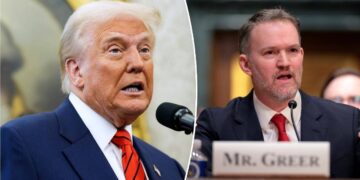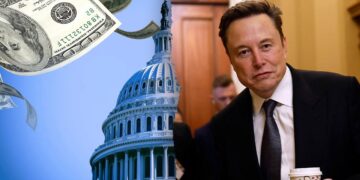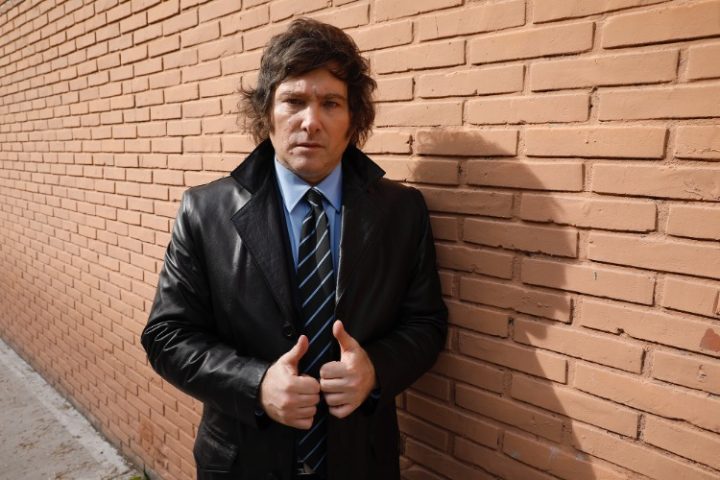
In honor of Javier Milei’s election as president of Argentina, we delve into the captivating history of free-market economics in Argentina, tracing back to the pioneering figures such as Juan Bautista Alberdi and highlighting the contributions of modern-day proponents such as Alberto Benegas Lynch, Jr. and, of course, the victorious advocate of those men and those policies, Javier Milei. This article explores the influential lectures by renowned economists Leonard Read and Ludwig von Mises, shedding light on the efforts to promote a free market system in Argentina.
Juan Bautista Alberdi: Laying the Foundation
Argentina’s journey from tyranny to a free market began with its independence from Spain on July 9, 1816. The early years were marked by internal conflicts and the subsequent accession of Juan Manuel de Rosas, a dictator whose reign was characterized by despotism and civil disorder. The overthrow of Rosas in 1852 marked a turning point, leading to an era from 1850 to 1930 that was distinct in Latin American history. Exit Juan Rosas and enter Juan Alberdi.
Juan Bautista Alberdi, a prominent Argentine lawyer and diplomat, is widely recognized as a founding father of free-market economics in Argentina. His seminal work, Bases and Starting Points for the Political Organization of the Argentine Republic, published in 1852, provided a blueprint for a constitutional framework that emphasized the importance of individual rights, economic freedom, and a limited government role in the economy. Alberdi’s ideas served as a driving force in shaping Argentina’s economic policies for years to come.
In the drafting of the new Argentine constitution, Alberdi drew inspiration from the U.S. Constitution, as well as from the writings of Thomas Jefferson and James Madison. Alberdi, like the Founding Fathers, believed that the only legitimate basis for government was the consent of the governed and that government’s sole and express purpose was to protect the liberties and rights of the people. Consider this illuminating and inspiring selection from Alberdi’s book:
Today we must strive for free immigration, liberty of commerce, railroads, the navigation of our rivers, the tilling of our soil, free enterprise, not instead of our initial principles of independence and democracy, but as essential means of assuring ourselves that these will cease being mere words and will become realities.
What lofty, and, considering the election of Javier Milei, attainable goals! We in the United States could likewise see our principles become more than mere words and become the political, social, and economic reality for a generation of Americans yet unborn.
As reported by Jacob Hornburger, the results of Alberdi’s constitutional establishment on free-market principles were extraordinary:
For the only time in all of South American history, government’s power over the citizenry was extremely limited. With various exceptions (land grants to railroads being among the most notable), people were free to engage in any economic enterprise without governmental interference and to accumulate unlimited amounts of wealth. There was no income taxation, and indirect taxation was extremely low. Enterprise, by and large, was free — very few licenses, permits, regulations, and other governmental barriers interfered with people’s ability to earn a living. There was virtually no governmental welfare system. There were few barriers to trade and investment.
Imagine such a system being restored in the United States — political and economic polices founded on the free market and on the idea that liberty is the tide that lifts all boats and that individuals prosper faster and with greater success when government is prevented from “helping” the free market flourish.
And consider the larger effect on trade and domestic economic growth during this period, as recorded by David Rock in his book Argentina: 1516-1987:
By the outbreak of World War I Argentina had experienced almost twenty years of prodigal expansion. Per capita income equaled that in Germany and the Low Countries, and was higher than in Spain, Italy, Sweden, and Switzerland. Having grown at an average annual rate of 6.5 percent since 1869, Buenos Aires had become the second city of the Atlantic seaboard, after New York, and by far the largest city in Latin America…. Except entrepôts like Holland and Belgium, no country in the world imported more goods per capita than Argentina. By 1911, Argentina’s foreign trade was larger than Canada’s and a quarter of that of the United States.
End of an Era and the Rise of Perón
This era of prosperity, however, did not last. The 1930s saw a shift in Argentina’s economic policies following a military coup. The subsequent governments abandoned the principles of economic freedom for socialist and fascist economic models. The establishment of income taxation, a central bank, trade restrictions, and regulatory controls marked the beginning of Argentina’s decline. This shift toward a welfare state and regulated economy, similar to many other Latin American countries, led to recurring financial crises.
This marked the end of Argentina’s economic prosperity, eventually culminating in the election of Juan Perón, whose extreme welfare-state policies mirrored those of Franklin Roosevelt. Perón’s reign ended the era of Argentine liberty and prosperity.
As readers know, the United States followed a similar socialist trajectory, electing Franklin D. Roosevelt president four times! Roosevelt and his fellow fascists/socialists succeeded in enervating the American economy through similar policies, including the end of the gold standard and the establishment of a regulatory and welfare state that persists to this day.
Leonard Read and Ludwing von Mises Lectures
In 1958, in a quest to further promote the understanding and support of free-market economics in Argentina, a small group of Argentines led by Alberto Benegas Lynch (founder of the Estudio Sobre la Libertad) invited renowned economists Leonard Read (founder of the Foundation for Economic Education) and Ludwig von Mises (the unofficial head of the Austrian school of economics, who at that time teaching at New York University) to deliver a series of lectures throughout the country.
Read’s eloquent lectures on the virtues of free markets resonated with audiences across Argentina, fostering a deeper understanding of the benefits of economic liberty. In his introduction to his book Why Not Try Freedom? Read reports that each of his lectures were packed to overflowing.
“To everyone’s amazement, the 160 seats in the lecture room were filled the very first evening and 25 people were standing. The same was true for the entire series — testifying to an intense interest in liberty,” Read recalls.
In his book Economic Policy, Ludwig von Mises’s wife, Margit, records a similar reaction to her husband’s lectures in Argentina: “The audience reacted as if a window had been opened and fresh air allowed to breeze through the rooms,” she wrote.
Imagine such a breeze blowing through the windows of American homes and town halls!
Alberto Benegas Lynch, Jr.: A Modern-day Advocate
Building upon the foundations laid by Alberdi and his father, Alberto Benegas Lynch, Jr. stands as a prominent contemporary advocate for free-market economics in Argentina. His numerous books and articles have critically analyzed the shortcomings of interventionist policies and championed the importance of individual rights and economic freedom. Benegas Lynch, Jr.’s work has played a significant role in challenging conventional economic thinking in Argentina and igniting a renewed interest in free-market principles. He currently oversees the Escuela Superior de Economía, a program committed to carrying on the work of Alberdi and Lynch, as well as disseminating the scholarly support of free-market economic policies throughout Argentina and beyond.
The Rise of Javier Milei: A Victorious Advocate
The recent victory of Javier Milei, a vehement activist for free-market economics, in the Argentine political landscape underlines the enduring appeal of economic liberty among the people. Milei’s unapologetic promotion of free markets, deregulation, and fiscal responsibility resonated with Argentines disillusioned by years of interventionist policies. His election-day triumph signals a growing recognition of the benefits that come with embracing the principles of free-market economics.
The history of free-market economics in Argentina is rich with influential figures who have left an indelible mark on the nation’s economic landscape. From the pioneering efforts of Juan Bautista Alberdi to the modern-day triumphs of Alberto Benegas Lynch, Sr. and Jr., and Javier Milei, the pursuit of economic liberty has continued to gain traction in Argentina. The lectures delivered by Leonard Read and Ludwig von Mises further fortified the movement, providing intellectual ammunition to advocate for a free-market system. As Argentina moves forward, it is crucial to honor this history and continue to foster a culture that values free-market principles for the betterment of its people and economy.
Javier Milei certainly knows this history — this hopeful and happy history — and his victory likely is due in no small part to his ability to communicate this on the campaign trail and his passion not only for the principles and power of the free market, but for reacquainting his countrymen with their free-market past and the prosperity it brought to their country in the not-too-distant past.
We needn’t be left behind or left wishing we could see similar passion for the free market and our founding principles among our politicians. The United States has a history of liberty and free markets that surpasses that of every other country. We simply stand in desperate need of statesman familiar with that past, those principles, and possessed of the ability to communicate those things to voters.
This should be the lesson we learn from the victory of Javier Milei: Argentina today, America tomorrow!
Shop For Night Vision | See more…
Shop For Survival Gear | See more…
-
Sale!

Tactical Camo Nylon Body Armor Hunting Vest With Pouch
Original price was: $49.99.$39.99Current price is: $39.99. Select options This product has multiple variants. The options may be chosen on the product page -
Sale!

Japanese 6 inch Double Edged Hand Pull Saw
Original price was: $19.99.$9.99Current price is: $9.99. Add to cart



















































